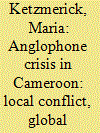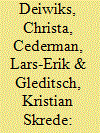| Srl | Item |
| 1 |
ID:
189357


|
|
|
|
|
| Summary/Abstract |
After years of peaceful demonstrations, the Cameroonian Anglophone conflict escalated in 2017. Since the outbreak, over 3,000 people have died and a further thousand Anglophones fled from clashes between state forces and separatist fighters. While activists in the diaspora bid for international support, organizational belonging on the ground changes quickly. The paper investigates the transnationalization of the conflict by looking at the complex set of actors involved. Overall, it is interested in the political sociology of transnational rebel governance. The paper highlights the effects of transnational conflict dynamics on the unity and fragmentation of the self-determination movement and its relation to violence.
|
|
|
|
|
|
|
|
|
|
|
|
|
|
|
|
| 2 |
ID:
112777


|
|
|
|
|
| Publication |
2012.
|
| Summary/Abstract |
Case study evidence suggests that inequality between regions in federations affects the risk of secessionist conflict. However, the conventional quantitative literature on civil war has found little support for a link between economic inequality and civil war. We argue that this seeming discrepancy in part stems from differences in the conceptualization of inequality and its operationalization, which has focused on individual-level wealth differences. In contrast, we investigate regional-level inequality, which is more readily applicable to understanding possible incentives for internal conflict. We adopt a spatial approach, based on new geo-coded data on administrative units in 31 federal states between 1991 and 2005, economic wealth, and ethnic settlements, and demonstrate strong evidence that regional inequality affects the risk of secessionist conflict. The results indicate that in highly unequal federations, both relatively developed and underdeveloped regions are indeed more likely to be involved in secessionist conflict than regions close to the country average. In addition, we provide evidence that exclusion from central state power as well as ethnic groups' access to regional institutions are associated with an increased risk for secessionist conflict. The findings on inequality remain robust even when controlling for other confounding factors such as country GDP, population and war history.
|
|
|
|
|
|
|
|
|
|
|
|
|
|
|
|